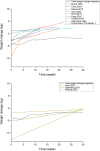Trajectory of the body weight after drug discontinuation in the treatment of anti-obesity medications
- PMID: 40691794
- PMCID: PMC12281790
- DOI: 10.1186/s12916-025-04200-0
Trajectory of the body weight after drug discontinuation in the treatment of anti-obesity medications
Abstract
Background: Globally, obesity has emerged as a significant public health concern, imposing detrimental impacts on human health. The purpose of our study was to explore the long-term effects of anti-obesity medications (AOMs) on body weight and to draw the trajectory of weight change after discontinuation of AOMs.
Methods: PubMed, Medline, Embase, the Cochrane Center Register of Controlled Trials for Studies, and Clinicaltrials.gov were searched from the inception to March 2024. Randomized controlled trials of AOMs conducted in population for at least 4 weeks and followed for 4 or more weeks after discontinuation were included. Weight change during treatment and after drug discontinuation was also reported. Random-effect model and meta-regression analysis were accordingly used.
Results: At week 4 after discontinuation, compared with the control group, AOM treatment still had weight loss effect (WMD = - 0.32 kg, 95% CI - 3.60-2.97, P = 0.85, I2 = 83%). At 8 weeks after drug discontinuation, AOMs were associated with significant weight regain compared with the control group (WMD = 1.50 kg, 95% CI 1.32-1.68, P < 0.0001, I2 = 0.0%). The weight regain trend remained at 12 and 20 weeks (WMD = 1.76 kg, 95% CI 1.29-2.24, P < 0.0001, I2 = 72.0%; WMD = 2.50 kg, 95% CI 2.27-2.73, P < 0.0001, I2 = 0.0%). Among the different subgroups of AOMs, significant weight regain after 12 weeks of drug discontinuation was observed only in studies with glucagon-like peptide 1 receptor agonist (GLP-1 RA) related drugs. In addition, studies in which weight loss was greater during treatment than in the control group and studies in which lifestyle interventions were continued observed significant weight gain after drug discontinuation.
Conclusion: Significant weight regain occurred 8 weeks after discontinuation of AOMs and was sustained through 20 weeks. Different weight regain was observed in subjects with different characteristics. Studies with longer follow-up duration are required to further investigate the potential factors associated with weight change after discontinuation of treatment.
Keywords: Anti-obesity medication; Meta-analysis; Treatment discontinuation; Weight change trajectory.
© 2025. The Author(s).
Conflict of interest statement
Declarations. Ethics approval and consent to participate: Not applicable. Consent for publication: Not applicable. Competing interests: The authors declare no competing interests.
Figures





Similar articles
-
Sertindole for schizophrenia.Cochrane Database Syst Rev. 2005 Jul 20;2005(3):CD001715. doi: 10.1002/14651858.CD001715.pub2. Cochrane Database Syst Rev. 2005. PMID: 16034864 Free PMC article.
-
Body weight and metabolic adverse effects of asenapine, iloperidone, lurasidone and paliperidone in the treatment of schizophrenia and bipolar disorder: a systematic review and exploratory meta-analysis.CNS Drugs. 2012 Sep 1;26(9):733-59. doi: 10.2165/11634500-000000000-00000. CNS Drugs. 2012. PMID: 22900950
-
Drug interventions for the treatment of obesity in children and adolescents.Cochrane Database Syst Rev. 2016 Nov 29;11(11):CD012436. doi: 10.1002/14651858.CD012436. Cochrane Database Syst Rev. 2016. PMID: 27899001 Free PMC article.
-
Green tea for weight loss and weight maintenance in overweight or obese adults.Cochrane Database Syst Rev. 2012 Dec 12;12(12):CD008650. doi: 10.1002/14651858.CD008650.pub2. Cochrane Database Syst Rev. 2012. PMID: 23235664 Free PMC article.
-
Low-carbohydrate versus balanced-carbohydrate diets for reducing weight and cardiovascular risk.Cochrane Database Syst Rev. 2022 Jan 28;1(1):CD013334. doi: 10.1002/14651858.CD013334.pub2. Cochrane Database Syst Rev. 2022. PMID: 35088407 Free PMC article.
References
-
- World Obesity Federation. World Obesity Atlas. 2024. Available at: https://data.worldobesity.org/publications/?cat=22. Accessed March, 2024.
-
- Ortega FB, Lavie CJ, Blair SN. Obesity and cardiovascular disease. Circ Res. 2016;118(11):1752–70. - PubMed
-
- Abdullah A, Peeters A, de Courten M, Stoelwinder J. The magnitude of association between overweight and obesity and the risk of diabetes: a meta-analysis of prospective cohort studies. Diabetes Res Clin Pract. 2010;89(3):309–19. - PubMed
-
- Calle EE, Rodriguez C, Walker-Thurmond K, Thun MJ. Overweight, obesity, and mortality from cancer in a prospectively studied cohort of U.S. adults. N Engl J Med. 2003;348(17):1625–38. - PubMed
-
- Grover SA, Kaouache M, Rempel P, et al. Years of life lost and healthy life-years lost from diabetes and cardiovascular disease in overweight and obese people: a modelling study. Lancet Diabetes Endocrinol. 2015;3(2):114–22. - PubMed
Publication types
MeSH terms
Substances
LinkOut - more resources
Full Text Sources
Medical

